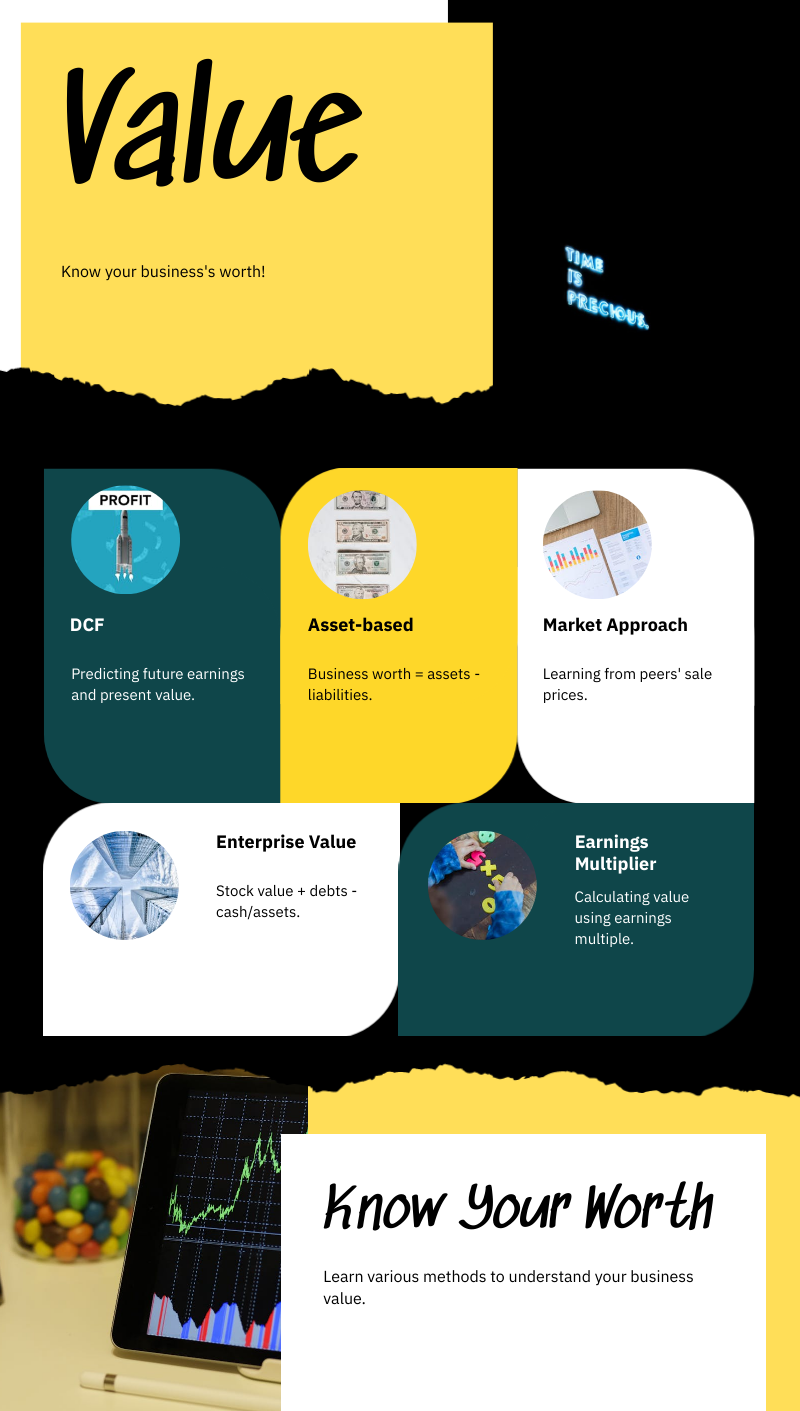How to Determine Your California Business's Value: A Straightforward Guide for Lower Middle-Market Owners
Uncover the True Worth of Your Business in California – Learn How to Determine the Value of a Business with Our Step-by-Step Guide.
How to Determine the Value of a Business
Thinking of selling, getting a loan, or just curious about your business's worth? This guide by Certified M&A Advisor Andrew Rogerson breaks down business valuation methods for California entrepreneurs like you.
Whatever the reason, knowing the value of your business is essential here in California. It's your key to making smart decisions, whether that's negotiating a fair deal, securing the financing you need, or ensuring your legacy is protected.
My goal with this guide is to cut through the jargon and give you the straight talk you need to understand what makes your California business tick – and what it's worth in today's market.
We'll dive into the key methods used to value businesses, all without the need for calculators or a finance degree. We've even got a whole collection of articles that go deeper into specific topics if you're hungry for more details.
So, grab a cup of coffee, kick back, and let's get started on this journey to uncover the true value of your California business. Ready? Let's dive in!

Understanding Business Valuation Methods
There's no one-size-fits-all answer when it comes to business valuation. Different methods work better for different types of businesses and situations. Let's break down the most common approaches:
Discounted Cash Flow (DCF): Projecting Your Future Profits
Fun Fact: Did you know that DCF is the preferred method for valuing high-growth tech startups in Silicon Valley? It's all about potential!
The DCF method is like looking into a crystal ball to see your business's future earnings. It involves:
- Projecting future cash flows: Estimating how much money your business will bring in over the next several years.
- Discounting those cash flows: Bringing those future dollars back to their present value, because money in hand today is worth more than money you'll get later.
- Terminal Value: Estimating what your business will be worth at the end of the projection period (think of it like a final sale price).
Formula Example:
Present Value = Future Cash Flow / (1 + Discount Rate)^Number of Years
Let's say your business is projected to generate $100,000 in cash flow next year, and you use a discount rate of 10%. The present value of that cash flow would be:
Present Value = $100,000 / (1 + 0.10)^1 = $90,909
You would repeat this calculation for each year of your projection period and then add the present values of all those cash flows to arrive at your business's value.
Want a detailed guide on calculating DCF? Check out our article on Calculate Business Valuation.
Asset-Based Valuation: What's Your Business Worth on Paper?
This method is all about what your business owns minus what it owes. We add up the value of all your assets (equipment, inventory, real estate, etc.) and subtract your liabilities (debts, loans).
Fun Fact: This method is particularly useful for asset-heavy California businesses, like those in manufacturing, agriculture, or commercial property.
Formula Example:
Net Asset Value = Total Assets - Total Liabilities
Let's say your business has $500,000 in assets and $200,000 in liabilities. Your net asset value (and a rough estimate of your business's worth) would be:
Net Asset Value = $500,000 - $200,000 = $300,000
To dig deeper into the formulas used in asset-based valuation, head over to our article on Business Valuation Formulas.
Market Approach: Looking to Your Peers
Ever heard the saying, "Keep your eyes on the competition"? That's the idea behind the market approach. We look at what similar businesses have recently sold for in California to get a sense of what yours might be worth.
Fun Fact: The Franchise Tax Board (FTB) in California sometimes uses the market approach to value businesses for tax purposes. So, it's a method even the state government finds useful!
Now, this isn't as simple as just finding the sale price of a similar business and calling it a day. We need to consider a lot of factors:
- Industry: Are you in tech, manufacturing, or something else?
- Size: How does your revenue and profit compare to similar companies?
- Location: Is your business in a prime spot or a more rural area?
- Growth Potential: Is your market expanding or saturated?
A business broker or valuation expert can help you navigate these complexities and find the most relevant "comps" (comparable companies) for your business.
For real-world examples of California business sales and the factors that influence price, check out our guide on How Much Can I Sell My Business For?.
Enterprise Value (EV): A Comprehensive View of Your Company's Worth
Think of enterprise value (EV) as the total price tag on your business, encompassing both its equity (what stockholders own) and its debt. It's a comprehensive way to look at your company's overall worth, especially if you're considering a merger or acquisition.
Fun Fact: In California's vibrant M&A market, EV is often used as a key metric in evaluating potential deals. It helps buyers get a full picture of the financial commitment involved.
Formula Example:
EV = Market Capitalization + Total Debt - Cash & Cash Equivalents
To understand this formula, you'll need to know:
- Market Capitalization: The total value of your company's outstanding shares.
- Total Debt: All the money your business owes to lenders.
- Cash & Cash Equivalents: The liquid assets your company has on hand.
By adding debt and subtracting cash, EV gives a more accurate picture of your business's total value than just looking at its stock price (market capitalization).
Earnings Multiplier: A Simplified Approach
This method is all about comparing your earnings to your business's value. We use a multiple – a factor that varies by industry and market conditions – and apply it to your earnings to get a rough estimate of your worth.
Fun Fact: In California's tech-savvy environment, a common multiple is the EV/EBITDA ratio (Enterprise Value to Earnings Before Interest, Taxes, Depreciation, and Amortization). This ratio helps compare valuations across different companies.
Formula Example:
Business Value = Earnings x Multiple
Let's say your business has an annual net income of $100,000, and the industry standard multiple is 5x. Your estimated business value would be:
Business Value = $100,000 x 5 = $500,000
To understand more about multiples and how they're used, check out our article on Company Valuation Multiples.
Additional Considerations for California Business Owners
California-Specific Factors:
Doing business in California comes with its own set of unique considerations. Here are a few to keep in mind:
- Regulatory Environment: California has stringent regulations in areas like environmental protection and labor laws. Compliance with these regulations can positively impact your business's value.
- Industry Trends: Certain industries, like technology and industrial services business, tend to have higher valuations in California due to strong demand and growth potential.
- Economic Climate: California's economy is dynamic and can be volatile at times. Economic factors like interest rates, inflation, and local market conditions can all influence your business's value.
Tax Implications:
Your business valuation can have significant tax implications in California. Whether you're selling your business, planning your estate, or dealing with property taxes, it's important to understand how your valuation might impact your tax liability.
Consult with a qualified tax professional to get personalized advice.
The Importance of Professional Guidance:
While you can certainly learn a lot about business valuation on your own, getting expert help is often the best way to ensure an accurate and reliable valuation.
A qualified professional, like a Certified Valuation Analyst (CVA) or a Certified M&A Advisor, can bring an objective perspective, deep industry knowledge, and expertise in navigating California's unique market dynamics.
Final Take: How to Determine Your Business Value in California
There you have it, California entrepreneurs. We've journeyed through the various methods of business valuation, tailoring them to your unique California context.
By now, you should have a better grasp of how to estimate your business's worth and calculate it's net worth, whether it's a managed service provider (MSP) in Silicon Valley, a manufacturing plant in the Central Valley, or a service-based business like HVAC contractors in Southern California.
Remember, knowing your business's value isn't just about numbers. It's about understanding your place in the dynamic California market and making informed decisions that align with your goals. For example: How to increase the value of your California manufacturing business before you sell?
My Parting Words
As a fellow Californian and a Certified M&A Advisor, I'm passionate about helping business owners like you succeed.
If you have any questions or need some personalized guidance on valuing your business, don't hesitate to reach out. Your success is my success, and together, we can make sure your California business thrives.
Related Resources: Dive Deeper into Valuation
Want to learn more? We've got a whole toolkit of articles to help you master business valuation:
- Business Valuation Formulas: Get the lowdown on the specific formulas used in asset-based valuation. Unlock business valuation formulas.
- How to Calculate Business Valuation: A step-by-step guide to the valuation process. Discover the guide to help you learn how to calculate business valuation.
- Business Valuation Methods: An overview of the different valuation methods and when to use them. Learn different business valuation methods to enhance understanding how to determine the business worth.
- How Much Can I Sell My Business For?: Real-world examples of California business sales and the factors that influence price. Wondering you business sale value? Find out how much can you sell your business for.
- Simple Business Valuation Calculator: A handy tool for estimating your business's value based on income. Go to the business valuation calculator and find out the estimate selling price of your business based on income and industry multiples.
If you are a professional service business, check out this simple guide on how to value a business with no assets.
With these resources at your fingertips, you'll be well-equipped to navigate the world of company valuations and make informed decisions about your California company's future.
Happy valuing!
Have Questions? We've Got Answers
Hey there! Can we send you a gift?
We just wanted to say hi and thanks for stopping by our little corner of the web. :) we'd love to offer you a cup of coffee/tea, but, alas, this is the Internet.
However, we think you'll love our email newsletter about building value and properly position your company before transition/exit your business ownership.
As a special welcome gift for subscribing, you'll also get our helping and educational guides, tips, tutorials, etc.. for free.
It's filled with the best practices for retiring serial business owners like Dan Gilbert, Larry Ellison, Warren Buffett, and many more.
Just sign up for our emails below.



